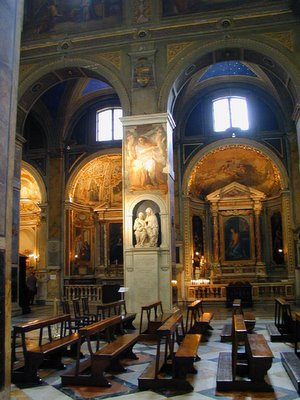The Church of Saint Augustine, in the Campus Martius, is certainly one of the most glorious churches of its size in the world. Porphyry, marble, gold, a magnificent High Altar by Bernini himself, paintings by Raphael, sculptures by Sansovino -- all for the greater glory of God and the Holy Sacrifice of the Mass.
Saint Augustine? Yes, the ancient title of the church which used to be at this spot was that of Saint Tryphon, as it had been dedicated to the great Phrygian martyr of that name. In the end of the 15th century, the small church dedicated to Saint Tryphon was substituted by this jewel of Catholic beauty (the old small church survived as an annex of the current building well into the 19th century), under the patronage of Saint Augustine "and very loved by Romans, for there the Madonna del Parto is [particularly] venerated".
In the Gospel side "of the High Altar are the remains of Saint Monica, who died and was buried in Ostia, and whose relics were translated to this place in the 15th century ... Monica followed Augustine because she willed his salvation; the Church follows all because of the redemptive sacrifice of Christ." (Source)
Today's readings (the Saturday after Ash Wednesday was probably the last day of Lent to have its own Mass, late in the History of the Rite -- which means around the late first millenium, in the last formative age of the Traditional Roman Mass, and many centuries after the fixation of the Roman Canon), as always, are particularly related to the Station Church. Saint Tryphon was venerated as a patrons of gardens and gardeners, and the Epistle may be a coincidence...

Saint Tryphon was particularly venerated as a miracle-worker, "From a young age he was blessed with the divine power to cure any type of sickness" (Source). Which is why the Gospel of this Saturday (St. Mark, vi, 47-56) mentions the miracle-working powers of the Lord:
In the Gospel side "of the High Altar are the remains of Saint Monica, who died and was buried in Ostia, and whose relics were translated to this place in the 15th century ... Monica followed Augustine because she willed his salvation; the Church follows all because of the redemptive sacrifice of Christ." (Source)
Today's readings (the Saturday after Ash Wednesday was probably the last day of Lent to have its own Mass, late in the History of the Rite -- which means around the late first millenium, in the last formative age of the Traditional Roman Mass, and many centuries after the fixation of the Roman Canon), as always, are particularly related to the Station Church. Saint Tryphon was venerated as a patrons of gardens and gardeners, and the Epistle may be a coincidence...
"And the Lord will give thee rest continually, and will fill thy soul with brightness and deliver thy bones, and thou shalt be like a watered garden, and like a fountain of water whose waters shall not fail." (Epistle of the Mass of the Day, Isaias, lviii, 9-14)

Saint Tryphon was particularly venerated as a miracle-worker, "From a young age he was blessed with the divine power to cure any type of sickness" (Source). Which is why the Gospel of this Saturday (St. Mark, vi, 47-56) mentions the miracle-working powers of the Lord:
"...when they had passed over, they came into the land of Genesareth and set to the shore. And when they were gone out of the ship, immediately they knew Him: and running through that whole country, they began to carry about in beds those that were sick, where they heard He was. And whithersoever He entered, into the towns or into villages or cities, they laid the sick in the streets and besought Him that they might touch but the hem of His garment, and as many as touched Him were made whole."